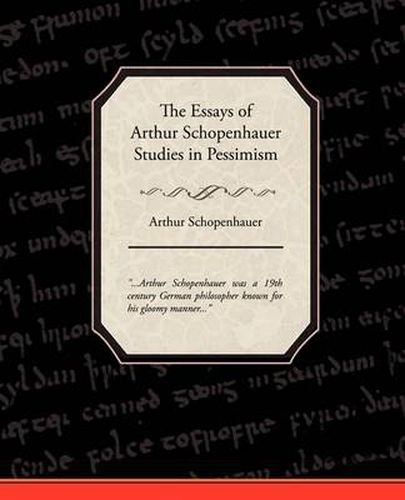Readings Newsletter
Become a Readings Member to make your shopping experience even easier.
Sign in or sign up for free!
You’re not far away from qualifying for FREE standard shipping within Australia
You’ve qualified for FREE standard shipping within Australia
The cart is loading…






This title is printed to order. This book may have been self-published. If so, we cannot guarantee the quality of the content. In the main most books will have gone through the editing process however some may not. We therefore suggest that you be aware of this before ordering this book. If in doubt check either the author or publisher’s details as we are unable to accept any returns unless they are faulty. Please contact us if you have any questions.
Arthur Schopenhauer was a 19th century German philosopher known for his gloomy manner. Schopenhauer’s The World as Will and Representation emphasized the role of man’s basic instinct, which Schopenhauer described as the will to exist, or will . Schopenhauer is known for his analysis of human motivation and the human condition. He argued that emotional, physical, and sexual desires can never be truly fulfilled. Schopenhauer favored a lifestyle of negating human desires, similar to the teachings of Buddhism. The note at the beginning of the text reads. The Essays here presented form a further selection from Schopenhauer’s _Parerga_, brought together under a title which is not to be found in the original, and does not claim to apply to every chapter in the volume. The first essay is, in the main, a rendering of the philosopher’s remarks under the heading of _Nachtraege zur Lehre vom Leiden der Welt_, together with certain parts of another section entitled _Nachtraege zur Lehre von der Bejahung und Verneinung des Willens zum Leben_. Such omissions as I have made are directed chiefly by the desire to avoid repeating arguments already familiar to readers of the other volumes in this series. The _Dialogue on Immortality sums up views expressed at length in the philosopher’s chief work, and treated again in the _Parerga_. The _Psychological Observations_ in this and the previous volume practically exhaust the chapter of the original which bears this title. The essay on _Women_ must not be taken in jest. It expresses Schopenhauer’s serious convictions; and, as a penetrating observer of the faults of humanity, he may be allowed a hearing on a question which is just now receiving a good deal of attention among us.
$9.00 standard shipping within Australia
FREE standard shipping within Australia for orders over $100.00
Express & International shipping calculated at checkout
Stock availability can be subject to change without notice. We recommend calling the shop or contacting our online team to check availability of low stock items. Please see our Shopping Online page for more details.
This title is printed to order. This book may have been self-published. If so, we cannot guarantee the quality of the content. In the main most books will have gone through the editing process however some may not. We therefore suggest that you be aware of this before ordering this book. If in doubt check either the author or publisher’s details as we are unable to accept any returns unless they are faulty. Please contact us if you have any questions.
Arthur Schopenhauer was a 19th century German philosopher known for his gloomy manner. Schopenhauer’s The World as Will and Representation emphasized the role of man’s basic instinct, which Schopenhauer described as the will to exist, or will . Schopenhauer is known for his analysis of human motivation and the human condition. He argued that emotional, physical, and sexual desires can never be truly fulfilled. Schopenhauer favored a lifestyle of negating human desires, similar to the teachings of Buddhism. The note at the beginning of the text reads. The Essays here presented form a further selection from Schopenhauer’s _Parerga_, brought together under a title which is not to be found in the original, and does not claim to apply to every chapter in the volume. The first essay is, in the main, a rendering of the philosopher’s remarks under the heading of _Nachtraege zur Lehre vom Leiden der Welt_, together with certain parts of another section entitled _Nachtraege zur Lehre von der Bejahung und Verneinung des Willens zum Leben_. Such omissions as I have made are directed chiefly by the desire to avoid repeating arguments already familiar to readers of the other volumes in this series. The _Dialogue on Immortality sums up views expressed at length in the philosopher’s chief work, and treated again in the _Parerga_. The _Psychological Observations_ in this and the previous volume practically exhaust the chapter of the original which bears this title. The essay on _Women_ must not be taken in jest. It expresses Schopenhauer’s serious convictions; and, as a penetrating observer of the faults of humanity, he may be allowed a hearing on a question which is just now receiving a good deal of attention among us.